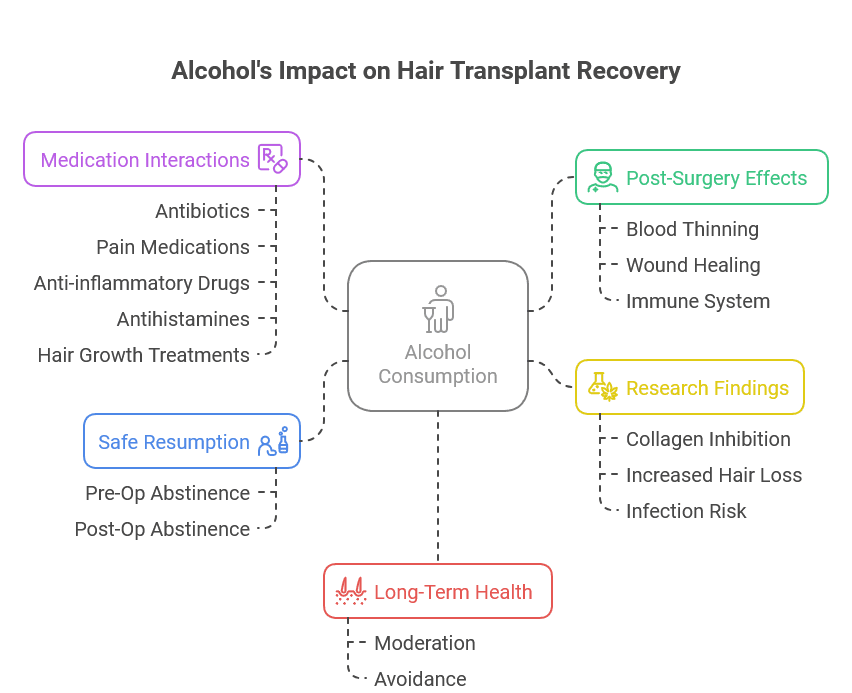Doctors typically recommend that people avoid alcohol for a week before and several weeks after a hair transplant in Istanbul to ensure proper recovery and get the best results. Why is this, and for how long do you need to abstain?
To answer this question, we must first look at the effects it has on the body and why it can interfere with the healing process after a treatment. We will also go over some of the recent research findings and offer some tips for long-term success.
The Effects of Alcohol on the Body Post-Surgery
The number one concern about alcohol consumption after an operation is that it will thin the blood, limiting the amount of oxygen and nutrients that are transported to the transplanted follicles.
This lowers the survivability of hair grafts and reduces the overall effectiveness of the procedure, but it also interferes with proper wound healing. That’s why you may experience excessive bleeding and need a couple of extra days for the incisions to close up.
Drinking is also linked to increased blood pressure, another factor that can destroy the still fragile follicles, and can weaken the immune system, which increases the risk of infections and inflammation. Finally, as everyone who has had a night of heavy drinking will know, alcohol dehydrates you, and a dry scalp is less elastic and reduces the chances of new hairs taking root.
Interactions with Post-Op Medications
Another reason you shouldn’t drink alcohol after a hair restoration procedure is that it can interfere with some of the medications you will be taking during recovery. Here is a short list of the most commonly used medications during the recovery period and how they interact with alcohol:
- Antibiotics – used for around 5 to 7 days to prevent infections, and alcohol can limit their effectiveness or cause unwanted side-effects like lightheadedness, nausea, vomiting, elevated heart rate, and high blood pressure.
- Pain medications – prescribed for the first 3 to 5 days to help with the pain, and mixing these with alcohol can increase the chances of liver toxicity, have strong sedative effects, stomach ulcers, and a weakened immune system.
- Anti-inflammatory drugs – these are also commonly used in the first few days post-op to reduce inflammation, but can cause severe stomach problems if combined with an alcoholic beverage.
- Antihistamines – given to patients to help them deal with itchiness during the first week or two, if needed, and having a few drinks alongside them causes significantly increased drowsiness and impaired cognitive function.
- Hair growth treatments – a long-term prescription to prevent further hair loss after an operation, and although Finasteride doesn’t have any negative interactions with alcohol, combined with Minoxidil, it can cause headaches, dizziness, and even fainting.
As you can see, there are plenty of adverse effects when drinking while taking most of the typical post-op medication, so it’s best to abstain for some time after a hair transplant surgery.
What Research Says About Alcohol and Hair Transplants
How can alcohol affect your recovery? What does science have to say about it?
Well, according to some of the relevant studies, it inhibits collagen biosynthesis in fibroblasts, the cells responsible for repairing connective tissues in the body, thus slowing down the rate of healing in the micro-incisions made in the scalp.
This can cause up to half of the total grafts to die out during the first week after the procedure, and there was even a big study involving 40+ patients showing that drinking during the first month after surgery doubled the amount of hair loss.
As it dries out the skin, it also prevents the wounds from closing up quickly and increases the risk of infections after a hair transplant procedure.

When and How to Safely Resume Drinking
You should stop drinking alcohol for at least a whole week before the operation to avoid the anticoagulant effect and increased blood pressure. This significantly reduces the risk of complications and ensures the highest graft survivability rates.
The first five days post-op are crucial, as this is when the tiny wounds heal and the grafts start to take root and strengthen. Proper blood flow is essential, so you must refrain from drinking during this time, at the very least, and preferably until the end of the second week, when the scalp has fully healed.
Even though recovery periods will vary slightly from patient to patient, as one of the studies mentioned above has demonstrated, all alcohol should be avoided for a full month after surgery for the best results.
The risks are just too great at this stage to be ignored.
Long-Term Hair Health and Alcohol Consumption
We have covered all the big reasons why you shouldn’t consume alcohol right before and after the procedure, but it is generally harmful and can limit the success of the operation in the long term as well. While it’s relatively safe to start drinking in moderation 14–30 days post op, if you want to keep your hair transplant results for as long as possible, you should avoid alcohol as much as you can in the upcoming years.

